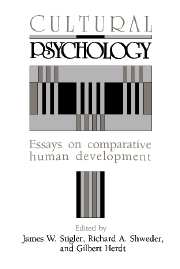Book contents
- Frontmatter
- Contents
- Preface
- Cultural psychology – what is it?
- Part I The keynote address
- Part II Cultural cognition
- Part III Cultural learning
- Part IV Cultural selves
- Part V Cultural conceptions of psychoanalysis
- Part VI Cultural domination and dominions
- Part VII A skeptical reflection
- List of conference participants
- Name index
- Subject index
Cultural psychology – what is it?
Published online by Cambridge University Press: 05 June 2012
- Frontmatter
- Contents
- Preface
- Cultural psychology – what is it?
- Part I The keynote address
- Part II Cultural cognition
- Part III Cultural learning
- Part IV Cultural selves
- Part V Cultural conceptions of psychoanalysis
- Part VI Cultural domination and dominions
- Part VII A skeptical reflection
- List of conference participants
- Name index
- Subject index
Summary
A discipline is emerging called “cultural psychology.” It is not general psychology. It is not cross-cultural psychology. It is not psychological anthropology. It is not ethnopsychology. It is cultural psychology. And its time may have arrived, once again.
While the authors in this volume were never asked to define or explicitly address the idea of a cultural psychology, several of the chapters turned out to be examples of it. They inspired this essay – which is a preliminary attempt to say, taxonomically and narratively, and briefly – what the discipline of cultural psychology was, is, and ought to be about. Ultimately it is a story of cyclical return.
In the short run, however, the essay is a story of one of the pitfalls of the “cognitive revolution” of the 1960s, the failure of the cognitive revolution to develop an adequate theory of the “person,” because of the prevailing Platonism implicit in its scientific agenda. The essay is also a scouting expedition across the boundaries of some very treacherous disciplinary territories in the search to recover an important interdisciplinary identity.
Cultural psychology is the study of the way cultural traditions and social practices regulate, express, transform, and permute the human psyche, resulting less in psychic unity for humankind than in ethnic divergences in mind, self, and emotion. Cultural psychology is the study of the ways subject and object, self and other, psyche and culture, person and context, figure and ground, practitioner and practice live together, require each other, and dynamically, dialectically, and jointly make each other up.
- Type
- Chapter
- Information
- Cultural PsychologyEssays on Comparative Human Development, pp. 1 - 44Publisher: Cambridge University PressPrint publication year: 1990
- 438
- Cited by



